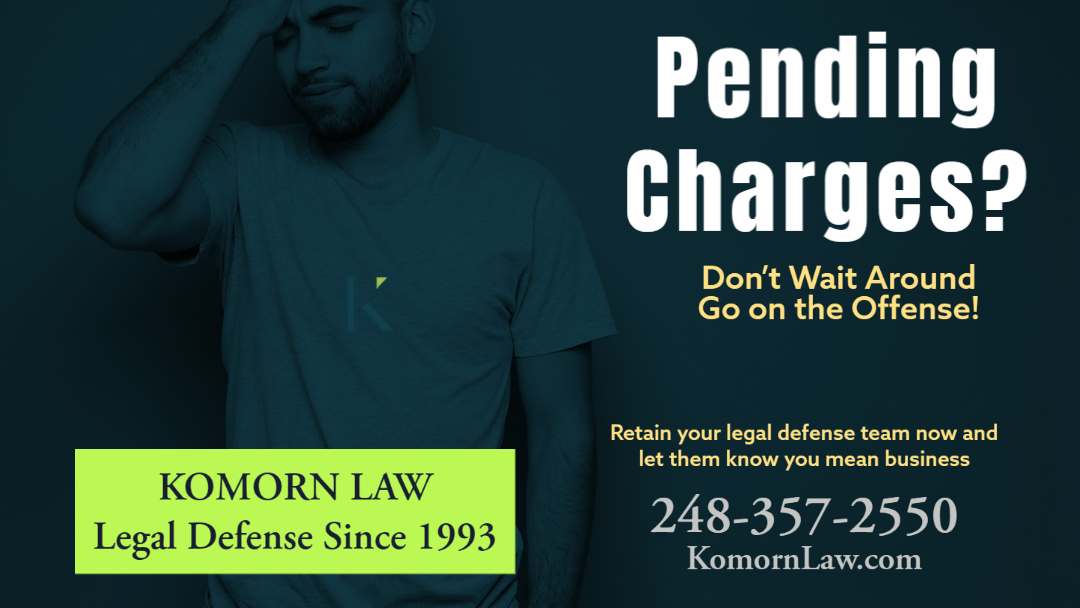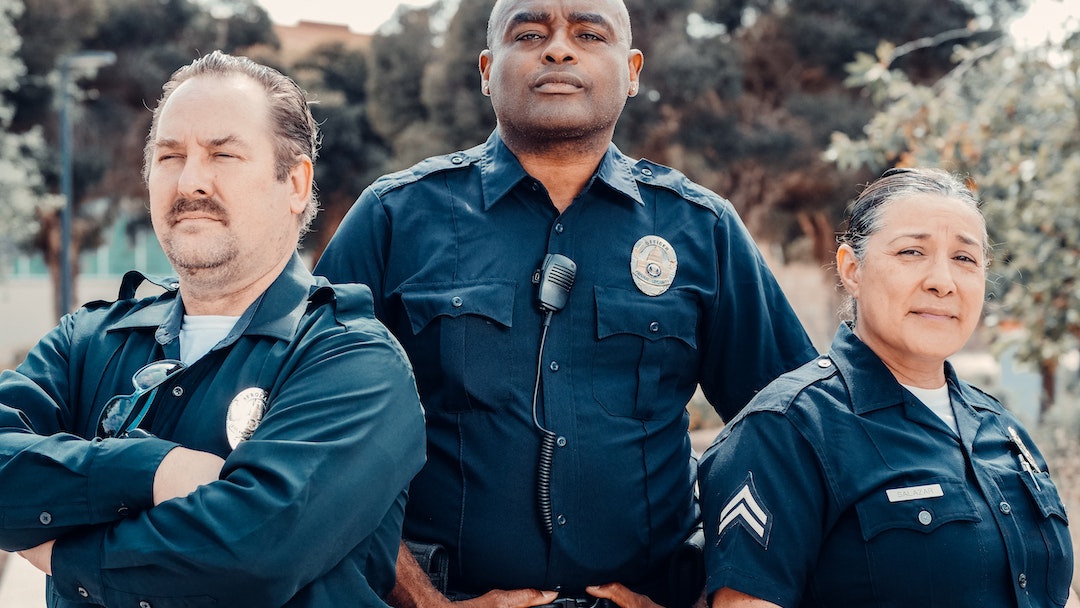
Jun 19, 2023 | Arrested, Blog, Know Your Rights, Your Rights
Pending Charges. Don’t wait. Get ahead of their game.
If you have been arrested but not charged yet. Don’t wait while they build evidence and take your statements to use against you!
They may just be building a case against you and letting you get more comfortable that it is going away till they spring their trap and try to get you to plea. Thus possibly destroying your future.
Call Us for a Free Case Evaluation
What do pending charges mean?
When you are arrested in Michigan, the charges against you are considered “pending” until you have been arraigned in court. At the arraignment, the judge will read the charges against you and you will enter a plea of guilty, not guilty, or no contest. If you plead not guilty, your case will proceed to trial. If you plead guilty, you will be sentenced by the judge.
Pending charges can have a significant impact on your life, even if you are ultimately found not guilty. You may be denied employment, housing, or loans. You may also have to post bail, which can be expensive.
If you have been arrested in Michigan, it is important to speak with an attorney as soon as possible. An attorney can help you understand the charges against you and your options for defending yourself.
Here are some of the things that can happen after you are arrested in Michigan with pending charges:
- You may be released on bail.
- You may be held in jail until your trial.
- You may be required to wear a GPS tracking device.
- You may be prohibited from contacting the victim of the crime.
- You may be required to attend counseling or treatment programs.
The specific consequences of pending charges will vary depending on the charges against you and the circumstances of your case. It is important to speak with an attorney to understand what to expect.
Here are some of the things you can do if you have pending charges in Michigan:
- Hire an attorney.
- Attend all court appearances.
- Comply with all court orders.
- Stay out of trouble.
- Contact the court if you have any questions or concerns.
It is important to remember that you are innocent until proven guilty. If you have been arrested in Michigan, it is important to speak with an attorney to protect your rights.
If you or someone you know has been accused of a crime or DUI.
Call Komorn Law – Call Now 248-357-2550
Komorn Law Social Media
Recent Posts
Tag Cloud
Blog
Cannabis Science
Criminal Defense Attorney Michael Komorn
Driving
DUI
Forfeiture
Health Benefits of Marijuana
Hemp
Know Your Rights
Komorn Law Blog
LARA-MMFLA Info
Legalization
Marijuana Criminal Defense Attorney Michael Komorn
Medical Marijuana
Medical Marijuana Attorney Michael Komorn
Michigan Laws
Michigan Medical Marhuana Regulation
Michigan Medical Marijuana Act
Michigan Medical Marijuana Criminal Defense
Michigan Medical Marijuana Criminal Defense Attorney Michael Komorn
Michigan News
Michigan Supreme Court
News
Planet Green Trees Radio
Recent Victories
Supreme Court
Uncategorized
USA news
Victories Project
Your Rights
DISCLAIMER
This website and/or post may contain re-posted content, opinions, comments, ads, third party posts, outdated information, posts from disgruntled persons, posts from those with agendas, private stuff, work related information, non work related information and general internet BS. Therefore…Before you believe anything on the internet regarding anything and everything – do your research on “Official Government and State Sites”, Call the Michigan State Police, Check the State Attorney General Website and Consult an Attorney – Use Your Brain. You’re on the internet.

Jan 20, 2023 | Blog, Educational, Know Your Rights, Michigan Laws
When you’re pulled over by the police and your friend throws their stash under your seat. Are they still your friend? That’s up to you. But at the moment you probably are going to take the fall, pay the price and have your life turned inside out and upside down. The justice system is hungry… and it eats money to keep it fat.
In Michigan, if drugs are discovered in your car, you as the driver are responsible for them. Under Michigan law it is assumed that you have control of any property that may be present inside your vehicle, you could be arrested and charged with possession.
While you cannot always control what a passenger brings into your vehicle, you can still get into trouble if they have an illegal substance on their person. Even if you are in possession of the illegal drugs, you can still be charged with constructive possession.
To Consent or not to Consent
A police officer cannot search your car without either your consent or reasonable suspicion. If a search was conducted unlawfully, the evidence might be suppressed, which would be to your advantage and possibly lead to the drug case being dismissed.
Although they may do so without your consent, the best preventive measure is to never consent to a police search of your vehicle. But if they already have discovered a friend’s drugs in your car, it’s crucial that you remain silent and refuse to give any interviews or statements without your lawyer present.
Admit Nothing
The majority of the time, when police have reason to believe you knew drugs were in your car, it’s because you confessed to knowing. Don’t make any admissions!
Police frequently act as though they are trying to help you or even say things that will make you think that cooperating with them might be advantageous for you. Always keep in mind that the police are not your friends and that admitting that you were aware that drugs were present will not help your case.
Even if the drugs in your car actually belong to a friend and you had nothing to do with their possession, the police must link you to their possession in order to arrest you.
If you or someone you know has been accused of a crime, DUI or Drugged Driving. Call Komorn Law and turn your defense into an offense.
Call Now 248-357-2550
Don’t Take the Fall
Whether or not you knew that a friend’s drugs were in your car—and even if you didn’t—you could still be arrested. You must act to defend yourself because the drugs were discovered in a vehicle that is yours.
Prosecutors frequently hear the justification that “the drugs were someone else’s” because people are frequently stopped by police and claim that any drugs found in their vehicles were not theirs despite the fact that they were. “
The most crucial action you should take if the police find your friend’s drugs is to gather all the information and speak with an experienced Michigan criminal defense attorney.
Drug Possession and Criminal Defense Lawyer offers aggressive defense against DUI, Driving While High, Marijuana, Medical Marijuana and all criminal charges in Oakland County, Macomb County, Lapeer County, Washtenaw County, Ann Arbor, Birmingham, West Bloomfield, Grand Rapids, Lansing and The entire State of Michigan. Michigan.gov
Komorn Law Social Media
Recent Posts
Tag Cloud
2021
BMMR
cannabis
CBD
corruption. prosecutors
dispensary
Driving
DUI
forfeiture
gun rights
hemp
komornlaw
lara
law enforcement abuse
laws
Legalization
marijuana
Medical Marijuana
Michigan
michigan laws
michigan news
MMFLA
MRA
news
police
politics
science
usa news
us supreme court
Your Rights
DISCLAIMER
This post may contain re-posted content, opinions, comments, ads, third party posts, outdated information, posts from disgruntled persons, posts from those with agendas, private stuff and general internet BS. Therefore…Before you believe anything on the internet regarding anything – do your research on “Official Government and State Sites”, Call the Michigan State Police, Check the State Attorney General Website and Consult an Attorney – Use Your Brain. You’re on the internet.

Nov 4, 2022 | Blog, Know Your Rights
When facing criminal charges you have the right to have a trial by jury. The justice system will offer you the right to a jury trial. It’s just a matter if you can afford that right. A jury trial with an attorney that is not a public defender can be costly. If you give up that right and take a plea deal you will not have a choice or chance to defend your rights and will be at the mercy of the deal you agreed to and the court.
“Hiring the right lawyer is the most important part of your case”
Kim W
Sixth Amendment
The Sixth Amendment guarantees the rights of criminal defendants, including the right to a public trial without unnecessary delay, the right to a lawyer, the right to an impartial jury, and the right to know who your accusers are and the nature of the charges and evidence against you.
It has been most visibly tested in a series of cases involving terrorism, but much more often figures in cases that involve (for example) jury selection or the protection of witnesses, including victims of sex crimes as well as witnesses in need of protection from retaliation.
Amendment VI
In all criminal prosecutions, the accused shall enjoy the right to a speedy and public trial, by an impartial jury of the state and district wherein the crime shall have been committed, which district shall have been previously ascertained by law, and to be informed of the nature and cause of the accusation; to be confronted with the witnesses against him; to have compulsory process for obtaining witnesses in his favor, and to have the assistance of counsel for his defense.
Source / Learn more…
STATE of MICHIGAN
STATE CONSTITUTION (EXCERPT)
CONSTITUTION OF MICHIGAN OF 1963
§ 14 Jury trials.
Sec. 14.
The right of trial by jury shall remain, but shall be waived in all civil cases unless demanded by one of the parties in the manner prescribed by law. In all civil cases tried by 12 jurors a verdict shall be received when 10 jurors agree.
History: Const. 1963, Art. I, § 14, Eff. Jan. 1, 1964
Former Constitution: See Const. 1908, Art. II, § 13.
Link
The Right to a Trial by Jury
by Michael Komorn
If you or someone you know has been accused of a crime, DUI or Drugged Driving. Call Komorn Law and turn your defense into an offense.
Call Now 248-357-2550
Amdt7.2.2 Identifying Civil Cases Requiring a Jury Trial
Seventh Amendment:
In Suits at common law, where the value in controversy shall exceed twenty dollars, the right of trial by jury shall be preserved, and no fact tried by a jury, shall be otherwise re-examined in any Court of the United States, than according to the rules of the common law.
The Seventh Amendment grants a right to a jury trial in Suits at common law,
which the Supreme Court has long interpreted as limited to rights and remedies peculiarly legal in their nature, and such as it was proper to assert in courts of law and by the appropriate modes and proceedings of courts of law.
1 The drafters of the Seventh Amendment used the term common law
to clarify that the Amendment does not provide a right to a jury in civil suits involving the types of equitable rights and remedies that courts enforced at the time of the Amendment’s framing.2
Two unanimous decisions, in which the Supreme Court held that civil juries were required, illustrate the Court’s treatment of this distinction. In the first suit, a landlord sought to recover, based on District of Columbia statutes, possession of real property from a tenant allegedly behind on rent. The Court reasoned that whether a close equivalent to [the statute in question] existed in England in 1791 [was] irrelevant for Seventh Amendment purposes.
3 Instead, the Court stated that its Seventh Amendment precedents require[d] trial by jury in actions unheard of at common law, provided that the action involves rights and remedies of the sort traditionally enforced in an action at law, rather than in an action at equity or admiralty.
4 The statutory cause of action, the Court found, had several analogs in the common law, all of which involved a right to trial by jury.5
In a second case, the plaintiff sought damages for alleged racial discrimination in the rental of housing in violation of federal law, arguing that the Seventh Amendment was inapplicable to new causes of action Congress created. The Court disagreed: The Seventh Amendment does apply to actions enforcing statutory rights, and requires a jury trial upon demand, if the statute creates legal rights and remedies, enforceable in an action for damages in the ordinary courts of law.
6
In contrast, the Court has upheld the lack of a jury provision in certain actions on the ground that the suit in question was not a suit at common law within the meaning of the Amendment, or that the issues raised were not particularly legal in nature.7 When there is no direct historical antecedent dating to the Amendment’s adoption, the court may also consider whether existing precedent and the sound administration of justice favor resolution by judges or juries.8
The Seventh Amendment does not apply to cases in admiralty and maritime jurisdiction in which the court conducts a trial without a jury.9 Nor does it reach statutory proceedings unknown to the common law, such as an application to a court of equity to enforce an administrative body’s order.10 For example, Congress, under the Occupational Safety and Health Act, authorized an administrative agency to make findings of a workplace safety violation and to assess civil penalties related to such a violation. Under the statute, an employer that has been assessed a penalty may obtain judicial review of the administrative proceeding in a federal court of appeal.11 The Supreme Court, in Atlas Roofing Co. v. Occupational Safety & Health Review Commission, unanimously rejected the argument that the law violated the Seventh Amendment because it authorized penalties to be collected from an employer without a jury trial:
At least in cases in which public rights
are being litigated-e.g., cases in which the government sues in its sovereign capacity to enforce public rights created by statutes within the power of Congress to enact-the Seventh Amendment does not prohibit Congress from assigning the factfinding function and initial adjudication to an administrative forum with which the jury would be incompatible.12
On the other hand, if Congress assigns such cases to Article III courts, a jury may be required.
In Tull v. United States,13 the Court ruled that the Seventh Amendment requires a jury to determine whether an entity is liable for civil penalties under the Clean Water Act, which authorizes the Administrator of the Environmental Protection Agency to initiate a civil action in a federal district court to enforce the Act. In the Court’s view, the penal nature of the Clean Water Act’s civil penalty remedy distinguishes it from restitution-based remedies available in equity courts.14
Consequently, it is a type of remedy that only courts of law could impose.15 However, a jury trial is not required to assess the amount of the penalty. Because the Court viewed assessment of the amount of penalty as involving neither the substance
nor a fundamental element
of a common-law right to trial by jury, it held permissible the Act’s assignment of that task to the trial judge.
Later, the Court relied on a broadened concept of public rights
to define the limits of congressional power to assign causes of action to tribunals in which jury trials are unavailable.
As a general matter, public rights
involve ‘the relationship between the government and persons subject to its authority,’
whereas private rights
relate to ‘the liability of one individual to another.’
16 In Granfinanciera, S.A. v. Nordberg,17 the Court held that Congress lacks the power to strip parties contesting matters of private right of their constitutional right to a trial by jury.
The Seventh Amendment test, the Court indicated, is the same as the Article III test for whether Congress may assign adjudication of a claim to a non-Article III tribunal.18 Although finding room for some debate,
the Court determined that a bankruptcy trustee’s right to recover for a fraudulent conveyance is more accurately characterized as a private rather than a public right,
at least when the defendant had not submitted a claim against the bankruptcy estate.19
Komorn Law Social Media
Recent Posts
Tag Cloud
2021
BMMR
cannabis
CBD
corruption. prosecutors
dispensary
Driving
DUI
forfeiture
gun rights
hemp
komornlaw
lara
law enforcement abuse
laws
Legalization
marijuana
Medical Marijuana
Michigan
michigan laws
michigan news
MMFLA
MRA
news
police
politics
science
usa news
us supreme court
Your Rights
DISCLAIMER
This post may contain re-posted content, opinions, comments, ads, third party posts, outdated information, posts from disgruntled persons, posts from those with agendas and general internet BS. Therefore…Before you believe anything on the internet regarding anything – do your research on Official Government and State Sites, Call the Michigan State Police, Check the State Attorney General Website and Consult an Attorney – Use Your Brain.

Oct 24, 2022 | Blog, Know Your Rights
Police are allowed to lie to you. One might believe that if you ask an undercover cop if they are a police officer they have to tell you. That’s not true. Police can and will lie to you.
It’s legal for cops to lie
- The Police may legally lie, bluff, mislead and intimidate you.
The police may not “strong arm” you into a confession.
- depriving the defendant of food, water, or use of the bathroom
- threats (threats to carry out the law like threatening to arrest a codefendant are usually acceptable)
- promises of “leniency” – even though they do.
- kicking, striking, or otherwise getting physical with a suspect.
- interrogating the suspect at gunpoint.
When encountering any law enforcement agency remember… they are not your friend
Famous one liners
- The famous line… Your partner is spilling the beans in the next room.
- Another famous line… This is just between you and me.
- Another one… Help me help you. Come clean and we will go easy on you.
- Here’s a good one… Talk to me and I’ll talk to the prosecutor about going easy on you.
- “There is video evidence”
- So many more
The Police Encounter will escalate negatively if and when a person:
- Makes an admission of guilt
- Consents to a search.
- Offer information that is unresponsive to the questions asked.
Refusing to answer questions is not an admission of guilt
- Asserting your right to remain silent is not an admission of guilt
- Demanding to have your lawyer present during any questioning is not an admission of guilt
- Refusing a search is not an admission of guilt.
Officers must have a reasons to detain you, if they do not, you are free to leave.
- If you are free to leave, and not being detained,
- What you say can and will be used against you.
- Miranda Rights are required to be read only if you are in “police custody” and you are being interrogated.
- Miranda warnings are not required to be read to you when you are arrested. If you are in police custody and you are not Mirandized, and you begin to talk or discuss something, and you have not been Mirandized, the statements can and will be used against you.
- If you are in custody… the police have no obligation to Mirandize you.
- Miranda Warnings are not required when the police are merely investigating, and the requirement of Miranda only applies after the police have arrested you, seized your person and specifically have begun to interrogate you, and or illicit information about the investigation or the alleged crime that has resulted in your arrest or custody.
- One of the Operative facts for 4th Amendment issues is the Seizure, arrest or detention of the person.
Law Enforcement Encounter? Remain silent and request your lawyer. Komorn Law 248-357-2550
Be aware of Phrasing:
- “Have you had anything to drink tonight?”
Best response is: NO - Where are you coming from?
It is best to have this answer pre-prepared so as to not raise suspicion. You can also answer the Officer’s questions by stating “Respectfully officer, I don’t have to answer that.” - “Not answering is suspicious, why are you not answering my question, clearly you are doing something wrong?”
Best Answer: “Officer, respectfully I am aware of my rights, and constitutional protections, and I know I have no legal obligation to answer your questions. - “Not answering is resisting me in this investigation”
Best Answer: “I’m not resisting, respectfully, I don’t have to answer anything.” - “If you have nothing to hide, you don’t mind if I look around.”
Best response: “I’m sorry Officer, but I don’t consent to searches.” - “If you refuse a search, I’ll have to call a K-9 unit.”
Best response: “Officer, are you detaining me, or am I free to go?” Officers cannot detain you past the purpose of the traffic stop and detaining you beyond this purpose is constitutionally illegal. Specifically officers cannot detain you beyond the traffic stop for the purpose of calling for a k-9 unit or drug sniffing dog.
Remember
- Refusing to answer questions is not an admission of guilt
- Asserting your right to remain silent is not an admission of guilt
- Demanding to have your lawyer present during any questioning is not an admission of guilt
- Refusing a search is not an admission of guilt.
Supreme Court Case
Cupp, 394 U.S. 731 (1969), was a United States Supreme Court case that affirmed the legality of deceptive interrogation tactics. On its own, police deception in interrogations did not automatically constitute misconduct.
Frazier v. Cupp, 394 U.S. 731 (1969)
Are You Allowed To Lie To The Police?
Hell no. You shouldn’t be talking to the police in the first place but if you’re talking, you’re doing something you shouldn’t be doing. As far as whether you can lie to the police, you can always be charged with obstruction. That’s why you’re always best to just not say anything at all.
Police have some code of ethics like a lawyer or a judge. But it doesn’t say that they can’t trick you into confessing. They are trained to do that, and they will do it.
Michigan law 750.479c – A person informed of criminal investigation by peace officer; prohibited conduct; violation; penalty; exception; definitions.
Related Links
Komorn Law Social Media
Recent Posts
Tag Cloud
2021
BMMR
cannabis
CBD
corruption. prosecutors
dispensary
Driving
DUI
forfeiture
gun rights
hemp
komornlaw
lara
law enforcement abuse
laws
Legalization
marijuana
Medical Marijuana
Michigan
michigan laws
michigan news
MMFLA
MRA
news
police
politics
science
usa news
us supreme court
Your Rights
DISCLAIMER
This post may contain re-posted content, opinions, comments, ads, third party posts, outdated information, posts from disgruntled persons, posts from those with agendas and general internet BS. Therefore…Before you believe anything on the internet regarding anything – do your research on Official Government and State Sites, Call the Michigan State Police, Check the State Attorney General Website and Consult an Attorney – Use Your Brain.
















